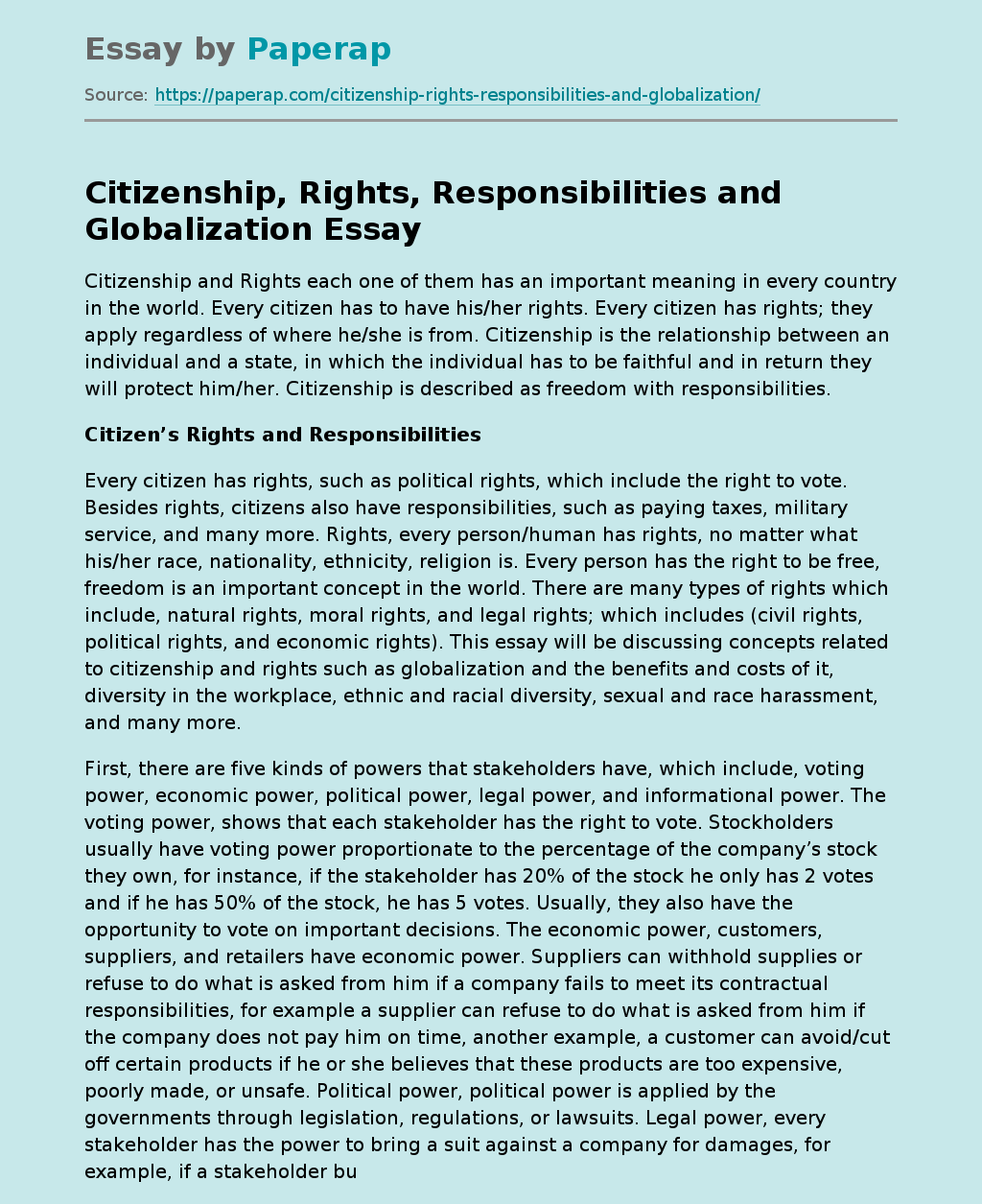Citizenship, Rights, Responsibilities and Globalization
Citizenship and Rights each one of them has an important meaning in every country in the world. Every citizen has to have his/her rights. Every citizen has rights; they apply regardless of where he/she is from. Citizenship is the relationship between an individual and a state, in which the individual has to be faithful and in return they will protect him/her. Citizenship is described as freedom with responsibilities.
Citizen’s Rights and Responsibilities
Every citizen has rights, such as political rights, which include the right to vote.
Besides rights, citizens also have responsibilities, such as paying taxes, military service, and many more. Rights, every person/human has rights, no matter what his/her race, nationality, ethnicity, religion is. Every person has the right to be free, freedom is an important concept in the world. There are many types of rights which include, natural rights, moral rights, and legal rights; which includes (civil rights, political rights, and economic rights).
This essay will be discussing concepts related to citizenship and rights such as globalization and the benefits and costs of it, diversity in the workplace, ethnic and racial diversity, sexual and race harassment, and many more.
First, there are five kinds of powers that stakeholders have, which include, voting power, economic power, political power, legal power, and informational power. The voting power, shows that each stakeholder has the right to vote. Stockholders usually have voting power proportionate to the percentage of the company’s stock they own, for instance, if the stakeholder has 20% of the stock he only has 2 votes and if he has 50% of the stock, he has 5 votes.
Usually, they also have the opportunity to vote on important decisions. The economic power, customers, suppliers, and retailers have economic power. Suppliers can withhold supplies or refuse to do what is asked from him if a company fails to meet its contractual responsibilities, for example a supplier can refuse to do what is asked from him if the company does not pay him on time, another example, a customer can avoid/cut off certain products if he or she believes that these products are too expensive, poorly made, or unsafe. Political power, political power is applied by the governments through legislation, regulations, or lawsuits. Legal power, every stakeholder has the power to bring a suit against a company for damages, for example, if a stakeholder buys something online and when he/she received it, it is not the same as shown on the website, the stakeholder has the rights to do/perform a lawsuit against the company, he/she can sue the company. Informational power, stakeholders have informational power if they have access to important data, facts, or details. For example, employees have informational, in which they know almost everything about the company and what is going in it, and they are not allowed to share it with other people that are not working in the company.
Globalization Pros and Cons
Globalization is a widely known/used term which describes the integration of the political, economic, and cultural activities. This integration/alliance allows people to interact and communicate with each other, travel with each other, etc. Globalization is also known as the increase in movement of goods, services, and capital across the world. Globalization helps spread technology, culture, and many other things. Globalization allows many companies to sell their products all around the world which is beneficial for the companies, because more people get to know about their products and they will start purchasing it, which will lead to an increase in some the sales and profits of many companies, also, the companies will become popular/known. Globalization has its benefits and costs, here are some of the benefits of globalization; one of the most important benefits of globalization, is that globalization increases economic productivity which has affected many countries, China for example has become an expert in electronics manufacturing, another benefit of globalization is that it reduces prices for consumers, for example if a person goes to Spinneys or Carrefour and he/she wants to buy a t-shirt or something, he/she will find its price to be low, which shows that the sources of Spinneys/Carrefour are brought from all over the world so this enables it to have low production costs. Globalization also benefits customers by offering/providing them with access to a wide range of various different goods and services. Globalization also helps entrepreneurs all over the world, giving all the countries access to foreign investments in order to support economic development. There are two other benefits of globalization, which are, that globalization transfers technology, where new and innovative ideas spread rapidly, also, globalization spreads democracy and freedom, and decreases military conflict. Globalization has a positive effect on many countries and companies, in which it provides them with benefits which will allow them to grow, succeed, be profitable, and many more. In contrast to the benefits provided by globalization, globalization also has costs/disadvantages, in which some countries and companies can be harmed by it.
Citizenship, Rights, Responsibilities and Globalization. (2021, Nov 17). Retrieved from https://paperap.com/citizenship-rights-responsibilities-and-globalization/

